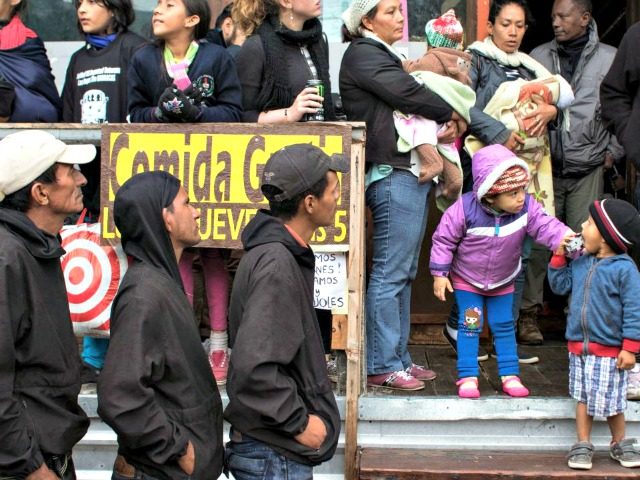 |
| Guillermo Arias/AFP/Getty Images |
President Joe Biden’s pro-migration border deputies are inviting another 100,000 migrants into Americans’ society, so putting more pressure on Americans’ ability to earn a decent wage or pay for good housing.
The policy of extracting more foreign workers for use in the U.S. economy is being touted by the White House as a “family reunification parole” program, even though Congress’s parole program is only for migrants “on a case-by-case basis for urgent humanitarian reasons or significant public benefit.”
“These new processes promote family unity and provide lawful pathways consistent with our laws and our values,” insisted the Cuban-born Alejandro Mayorkas, who is Biden’s pro-migration chief of the Department of Homeland Security.
The new gateway is needed because it will reduce the incentive for migrants to sneak across the border, Mayorkas argued: “The Department has proven that the expansion of safe, orderly, and lawful pathways, combined with strong enforcement, is effective in reducing dangerous, irregular migration to the United States.”
The program will allow the favored 100,000 migrants to skip the waiting line set by Congress’s annual limits on chain migration:
Certain nationals [living in] Colombia, El Salvador, Guatemala, and Honduras who are beneficiaries of an approved [immigration] Form I-130, Petition for Alien Relative may be eligible to be considered for parole under the new processes. Qualifying beneficiaries must be outside the United States, meet all requirements, including screening and vetting and medical requirements, and must not have already received an immigrant visa.
“The underlying premise of all these unlawful [migration] programs is that the president gets to decide who & how many foreigners move to the US, while Congress’s role is just to define the color of the ID cards they’re issued once they’re here,” said a tweet by Mark Krikorian, director of the Center for Immigration Studies. “It’s an inversion of the immigration law.” --->READ MORE HEREDHS Creates Yet Another Parole Program for Aliens to Cut in Line:
This one is for people from Colombia, El Salvador, Guatemala, and Honduras with relatives in the U.S.
On July 7, 2023, the U.S. Department of Homeland Security (DHS) announced it created a new parole program to allow nationals from four countries to skip the line to enter the United States ahead of all other green card-eligible aliens who must wait outside the country for an immigrant visa to become available.
The program is specifically aimed at “family reunification” for nationals of Colombia, El Salvador, Guatemala, and Honduras. DHS estimates that, today, as many as 73,500 aliens (32,600 Salvadorans; 17,400 Colombians; 12,800 Guatemalans; and 10,700 Hondurans) could be eligible to be paroled into the country and receive work authorizations under this program.
In addition to meeting specific eligibility criteria set out by DHS, nationals from these countries must demonstrate that they are a beneficiary of an approved Form I-130, Petition for Alien Relative to be considered under the new process. In other words, they are in line to be considered for a family-based green card, but will no longer have to wait in their home countries for one to become available.
This program builds off of precedent set by the Bush and Obama administrations, which set up similar, unauthorized parole programs in 2007 and 2014 to allow nationals from Cuba and Haiti, respectively, to be paroled into the United States if they had approved Form I-130s, establishing valid familial connections to U.S. citizens or green card holders.
Filing a Form I-130 establishes the beneficiary’s “place in line” for an available green card, but does not guarantee they will be approved. Annual green card issuances are subject to a numerical limits (caps) by statute, and therefore many Form I-130 beneficiaries must wait years to enter the United States as a green card holder. The annual limit for family-based categories depends on the previous year’s immigration levels and is set at a minimum of 226,000 visas; under the overall limit there are numerical caps for specific categories, such as siblings of adult U.S. citizens or unmarried adult sons and daughters of permanent residents.
This program, like other similar parole programs that have been instituted by the Biden administration since January 2021, is inconsistent with the language and history of the parole statute, which has afforded DHS increasingly limited authority to parole aliens into the United States on a “case-by-case” basis for “urgent humanitarian or significant public benefit” reasons. While DHS does claim that each parole grant will be made on a “case-by-case” basis, the program contradicts this claim by laying out specific eligibility requirements that applicants must meet in order to participate in the program, defining a class of people in a legislative manner rather than describing general DHS officer discretion. --->READ MORE HERE
If you like what you see, please "Like" and/or Follow us on FACEBOOK here, GETTR here, and TWITTER here.


No comments:
Post a Comment